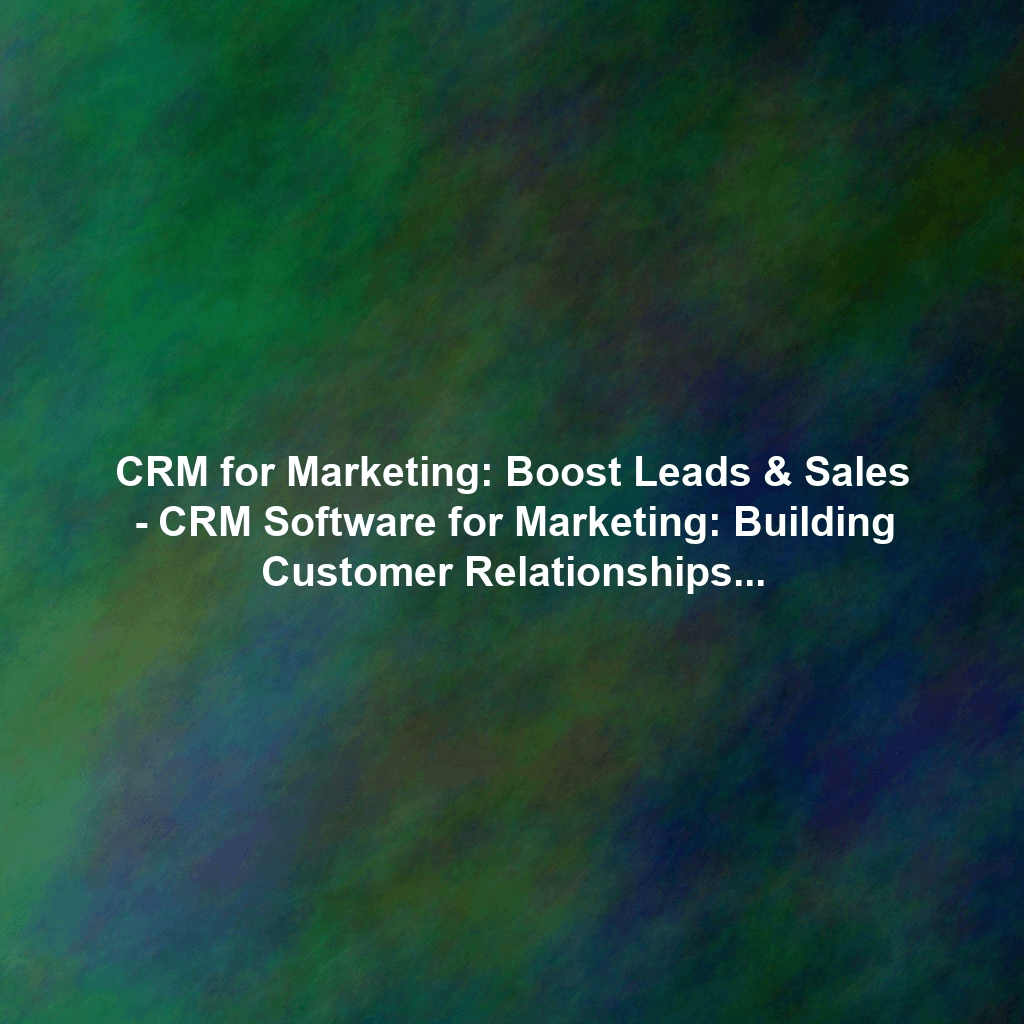In today’s competitive landscape, building strong customer relationships is paramount to success. Marketing efforts are no longer just about broadcasting messages; they’re about engaging with customers on a personal level, understanding their needs, and delivering relevant experiences. That’s where Customer Relationship Management (CRM) software comes into play. A well-chosen CRM can be the backbone of your marketing strategy, enabling you to nurture leads, automate marketing tasks, and ultimately, drive sales growth.
Why CRM is Essential for Modern Marketing
Gone are the days of disparate marketing systems. Modern marketers need a central hub to manage customer data, track interactions, and orchestrate campaigns. CRM software provides that unified platform, offering numerous benefits:
- Centralized Customer Data: Keep all customer information in one place, including contact details, purchase history, interactions, and preferences.
- Improved Lead Management: Capture, qualify, and nurture leads more effectively, ensuring that the right leads are passed to the sales team at the right time.
- Marketing Automation: Automate repetitive marketing tasks, such as email marketing, social media posting, and lead scoring, freeing up time for strategic initiatives.
- Personalized Customer Experiences: Deliver targeted messages and offers based on customer data, leading to increased engagement and conversion rates.
- Enhanced Sales Alignment: Facilitate collaboration between marketing and sales teams, ensuring a seamless customer journey.
- Data-Driven Decision Making: Track key metrics and generate reports to measure the effectiveness of marketing campaigns and identify areas for improvement.
Comparing Popular CRM Solutions for Marketing
Choosing the right CRM for your marketing needs can be daunting. Let’s take a look at some of the leading platforms and assess their strengths and weaknesses from a marketing perspective.
Salesforce Marketing Cloud
Salesforce is a behemoth in the CRM space, offering a comprehensive suite of tools for marketing, sales, and service. Its Marketing Cloud platform is particularly robust, providing advanced features such as:
- Email Marketing: Highly customizable email marketing capabilities with advanced segmentation and personalization.
- Marketing Automation: Sophisticated automation tools for creating complex customer journeys and triggering actions based on behavior.
- Social Media Management: Integration with social media platforms for managing social campaigns and monitoring brand mentions.
- Advertising Management: Tools for managing and optimizing online advertising campaigns.
- Analytics and Reporting: Powerful analytics dashboards for tracking key marketing metrics and measuring ROI.
Pros: Highly customizable, scalable, and feature-rich. Integrates well with other Salesforce products.
Cons: Can be complex and expensive, requiring significant training and implementation effort. Might be overkill for smaller businesses.
HubSpot CRM
HubSpot is known for its user-friendly interface and focus on inbound marketing. Its CRM is free to use, with paid add-ons for marketing, sales, and service.
- Contact Management: Organize and track customer interactions with detailed contact profiles.
- Email Marketing: Send targeted emails and track engagement with email marketing tools.
- Marketing Automation: Automate marketing tasks and nurture leads with workflow automation.
- Landing Pages: Create high-converting landing pages to capture leads.
- Reporting: Track key marketing metrics and measure the success of your campaigns.
Pros: Free to use, easy to set up and use, excellent for inbound marketing.
Cons: Limited functionality in the free version, can become expensive as you add more features.
Zoho CRM
Zoho CRM offers a comprehensive suite of features at a more affordable price point than Salesforce. It’s a good option for small and medium-sized businesses looking for a robust CRM without breaking the bank.
- Lead Management: Track leads from initial contact to conversion.
- Email Marketing: Send targeted email campaigns and track results.
- Marketing Automation: Automate marketing tasks and personalize customer experiences.
- Social Media Management: Manage social media accounts and engage with customers.
- Sales Pipeline Management: Track sales deals and manage your sales pipeline.
Pros: Affordable, comprehensive features, good for small and medium-sized businesses.
Cons: Interface can be less intuitive than HubSpot, may require some training.
Key Marketing Features to Consider When Choosing a CRM
Beyond the overall platform, consider these key marketing features when evaluating CRM solutions:
Lead Management
How effectively can the CRM capture, qualify, and nurture leads? Look for features like lead scoring, lead assignment, and lead tracking.
Marketing Automation
Can you automate repetitive marketing tasks and create personalized customer journeys? Evaluate the CRM’s workflow automation capabilities.
Email Integration
How well does the CRM integrate with your email marketing platform? Look for features like email tracking, email segmentation, and personalized email templates.
Sales Pipeline Tracking
Can you track sales deals and manage your sales pipeline effectively? Look for features like deal stages, win/loss analysis, and sales forecasting.
Reporting Capabilities
Can you generate reports to measure the effectiveness of your marketing campaigns and identify areas for improvement? Look for customizable dashboards and reporting tools.
Conclusion
Choosing the right CRM for your marketing needs is a critical decision that can significantly impact your ability to build customer relationships and drive sales growth. By carefully evaluating your specific needs and comparing the features of different CRM platforms, you can find the perfect solution to empower your marketing team and achieve your business goals. Remember to consider factors such as ease of use, scalability, integration capabilities, and pricing when making your decision. A well-implemented CRM will become the central nervous system of your marketing efforts, enabling you to deliver personalized experiences, automate tasks, and ultimately, build lasting customer relationships.
 Skip to content
Skip to content

